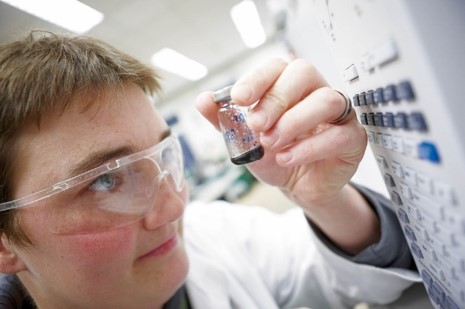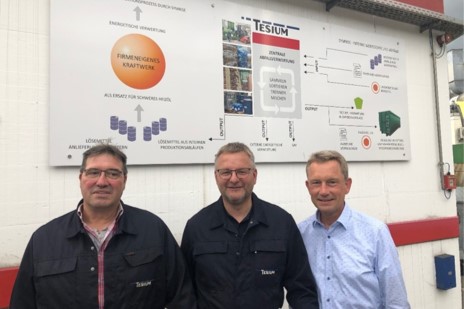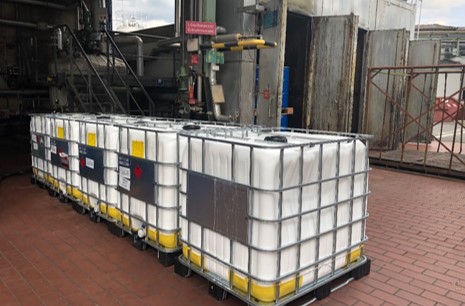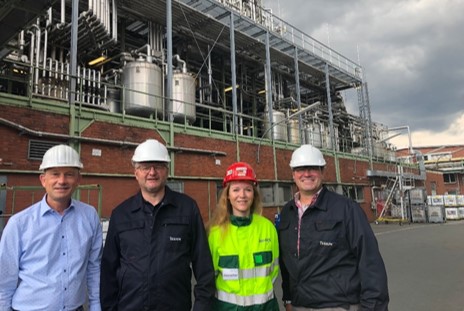Tesium GmbH: A smooth partnership based on continuity, competence and transparency
At its headquarters in Holzminden, Tesium GmbH part of the Symrise group, develops, produces and distributes fragrances, flavours and food ingredients, cosmetic raw materials and active ingredients, functional ingredients and product solutions for improved sensory perception and nutrition.
For its products, the company uses mainly natural raw materials such as vanilla, citrus, onions, fish, meat or flower and plant materials. The flavours, active ingredients, perfume oils and sensory solutions are mostly used as key functional components in the end products of manufacturers of perfumes, cosmetics, pharmaceuticals, food supplements, pet food and baby food.
These processes generate complex waste, which the company must dispose of carefully. Michael Nolte, head of waste disposal, his colleague Ingo Kramer, technical operations manager of the department, and Kai Wedding, head of marketing & sales, explain why Indaver was chosen as a key partner in the field of waste processing.
Partnerships with experts are vital
Michael Nolte explains: “The waste disposal department is responsible for optimal reuse of the waste produced on site. This waste can be used as a substitute for fossil fuels in our own power plant.” It provides energy directly to the production units in the form of steam and electricity. “This solution is only suitable for certain types of waste,” explains Ingo Kramer. “And this is precisely why Tesium and Symrise work with experts in their respective fields.”
“Our focus is on business continuity, employee protection and safe disposal channels.” A few years ago, the regulation known as the “Andienungspflicht” was abolished. It laid down a framework specifying which processing facilities we had to deliver our sensitive waste to. This opened up the market. Thanks to a good, long-standing partnership with Indaver for many of our waste materials, we stepped up our cooperation,” Nolte emphasises.


Direct regeneration and great flexibility
Ingo Kramer adds: “To ensure regeneration of waste, we worked closely with Indaver project manager Dina Filiz to draw up a waste disposal plan. This plan creates clarity for both sides, while at the same time maintaining a certain degree of flexibility. We visited and examined regeneration plants in Hamburg, Biebesheim and Kassel. As the entire process is one hundred percent transparent and compliant with legal requirements, we were very satisfied with the result.” Wedding points out: “Some of our waste is made up of highly concentrated materials and contains many different substances, which is why it is considered complex and sensitive.”
As early as the product development phase, Symrise and Tesium work together to avoid waste, return it to the production process and reuse it. “With this in view, we analyse it intensively and use checklists and questionnaires to identify all characteristics of the waste and decide the best processing options. We have the know-how for the entire process. Clear management creates the optimal conditions,” says Wedding.
Always the right solution
“During normal operation, we hold regular meetings with the Indaver project manager. If new waste streams arise due to new products, we look at the origin of the waste together. Which type of process leads to a particular waste product? What sustainable, safe disposal options are there in the current market?” says Ingo Kramer. “These are complex questions that require technical know-how and experience to find the right solutions,” adds Wedding.
“We have to be aware of the entire production chain. From the generation of waste, through the efficient logistics of the treatment plant in special vehicles, to the final stage of waste processing. Together with Indaver, we look for solutions to recycle or process the complex waste in a safe way. Open communication is vitally important and valuable in this context. We believe this works very well with Indaver,” concludes Michael Nolte.

